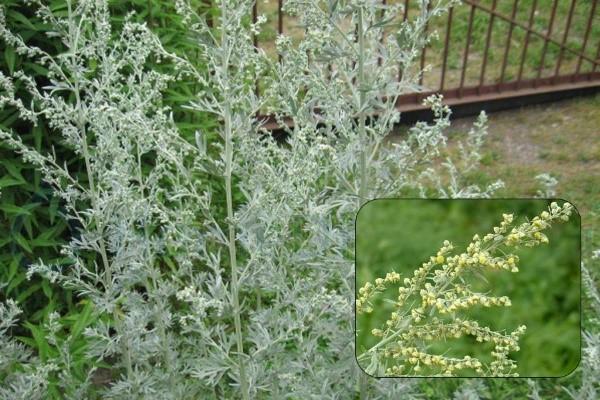Bitter herb wormwood
 Among medicinal plants, the bitter herb wormwood takes one of the first places. Its healing power has been known since ancient times, and tinctures and decoctions are widely used in folk medicine. The rich composition of vitamins, trace elements and essential oils gives wormwood the opportunity to beneficially influence the work of internal organs. What is this herb and what can it do?
Among medicinal plants, the bitter herb wormwood takes one of the first places. Its healing power has been known since ancient times, and tinctures and decoctions are widely used in folk medicine. The rich composition of vitamins, trace elements and essential oils gives wormwood the opportunity to beneficially influence the work of internal organs. What is this herb and what can it do?
Description of the plant: what it looks like, where it grows
It is easy to recognize wormwood by its appearance and smell. Its beautiful carved leaves and shoots are covered with a silvery coating, and if you rub them, you can clearly feel a sharp bitter aroma. And the herb tastes very bitter and any remedies based on it have this bitterness. So cases of overdose are extremely rare, because few people can drink a lot of nasty tincture. This is very good, since a large dose of wormwood has a negative effect on the nervous system.
Wormwood grows everywhere, especially along the roads, on wastelands and forest edges. And in gardens and orchards, silvery bushes are by no means uncommon and often turn into thickets weeds... The height of the bushes can reach 2 m, the stems are straight, branching at the top. It blooms in early summer with yellow flowers gathered in panicles.
Due to the large amount of essential oil, wild wormwood thickets often self-ignite in dry hot summers.
Bitter herb wormwood: medicinal properties
Wormwood is one of the most medicinal herbs and helps in the treatment and prevention of many diseases.
Bitter herb is famous for the following properties:
- cleanses the body of worms;
- promotes the outflow of bile;
- stimulates appetite;
- helps in the production of enzymes;
- relieves pain;
- relieves inflammation and cramps;
- cleans the blood;
- normalizes metabolism;
- restores the menstrual cycle;
- helps to heal wounds.
Harvesting wormwood for medicinal purposes begins at the beginning of flowering. It is then that more nutrients accumulate in it. Cut off the tops of the bushes up to 25 cm long and dry them. Plants spread out on paper should be turned over periodically.
Agitate wormwood, which is drying, you need to carefully so that pollen does not enter the respiratory tract. This can lead to severe irritation.
Contraindications
You can not take the bitter herb wormwood in the presence of such diseases:
- diseases of the central nervous system (has an exciting effect and causes hallucinations);
- gallstone disease (can lead to blockage of stones);
- acute forms of gastrointestinal disease;
- anemia;
- internal bleeding.
It is also worth refraining from herbal treatment for pregnant women, lactating women and children.